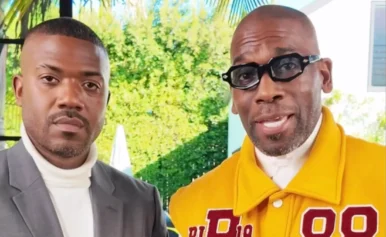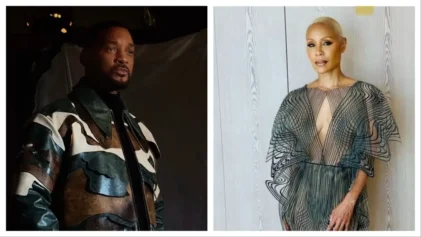
YouTube
Since he dropped his debut mixtape “Acid Rap,” Chance The Rapper has become the poster-boy for successful independent artists, especially in the hip-hop space. But his success is somewhat flukish and difficult to emulate, according to Apple Music’s Head of Artist Curation Carl Chery.
While chatting with the hosts of “Everyday Struggle,” Chery said it’s wrong for an independent artist to think he or she will have the Chicago native’s financial success and mainstream exposure.
“Chance [The Rapper] is an anomaly, he’s special, but his success is misleading,” stated Chery. “Now you have all these other independent artists thinking you don’t need a label. Chance is special. He’s charismatic, he’s smart as hell, he’s just special.”
Soon after, the website DJ Booth ran an editorial about independent artists and how difficult it is for them to be the next Chance, which eventually got the rapper’s attention. DJ Booth also questioned whether Chano is truly an independent artist or not, since he works with at least one person who’s heavily connected to the music industry.
“Since before he released his acclaimed “Acid Rap” mixtape, Chance has been repped by Cara Lewis, the most powerful booking agent in the industry,” the editorial read. “Does Lewis’ representation of Chance mean that he isn’t truly independent? Chance doesn’t owe anyone an apology for his success. He should be allowed to talk about leading the independent artist charge while knowing full well that the level of success he has achieved isn’t realistic for everyone.”
Chance eventually responded to the editorial and seemed none too pleased with the angle chosen by the writer. In fact, the “Coloring Book” creator accused the writer of painting a false picture about record labels and how vital they are to an artist’s career.
“This is wack,” Chance tweeted. “Ya’ll steady telling people they need a label, publisher, distributor to achieve success as an artist. That’s a lie … It’s only unrealistic because of the conditioning all artists are exposed to by different forms of media creating the narrative that you need to be discovered or put on in order to be successful. We wouldn’t seek out deals if mother—— knew there were other avenues.”
Chance also told independent artists to be patient and reminded them of the many well-known musicians who’ve shared their horror stories about being trapped in bad record deals. Clearly, his words aren’t an exaggeration.
In fact, in modern music times, record labels have been blamed for nearly ruining legendary artists like Lauryn Hill and popular rappers like Lil Wayne.
The rapper Jeezy can also be added to that long list since he blasted his label Def Jam a few years ago for not promoting his album well enough. “Where @LA_Reid when u need him,” wrote the Atlanta spitter when Reid was still at the label’s helm. “N—– @DefJamRecords, keep playing games if you want.”
Related news: Chance The Rapper
Dallas Reporter Wins Support from the Likes of Chance the Rapper After Woman Criticizes Her Body
Obama, Chance the Rapper to Speak at Summit for Civic Leaders and Artists
Chance The Rapper Announces Awards Show for Teachers, Principals and Other Educators
Eventually, after Chance responded to the DJ Booth piece, someone from the site wrote back, which raised one of the biggest questions among artists today: Is it better to release music independently or get the backing and financial assistance of a record label?
Nick Cannon spoke on the topic earlier this month and although he said independent artists can achieve plenty, they’ll still have to secure a major industry co-sign to become big.
“You can be the most talented person in music,” he told VladTV. “But if you don’t know somebody that controls, you know, one of them button pushers, it’s not going to pop for you. But it’s been a paradigm shift in the worlds of SoundCloud and digital to where you can make a lot of noise and get the right folks attention, but you still ain’t going to be popping until one of them button pushers say ‘I’m f—king with him.”
Besides wanting that major label co-sign, artists have said they’ve signed deals for the advance, so they can get money, live and focus on their craft.
“It can be positive because some people really need the money,” said New York rapper A$AP Ferg. “It’ll help out around the house or whatever the case may be. That’s the blessing about a deal. You get some advance money to take you out of your situation. You move out of the hood. Help your mother out. Whatever you gotta do with the money.”
Other artists have stated they signed record deals to get a better chance at securing radio play, TV spots and write-ups in the various music publications and newspapers.
But Jonny Shipes of Cinematic Music Group said times have shifted, and artists shouldn’t make getting on radio and TV the ultimate goal.
“I don’t think signing to a major label does anything for you out of the gate for a few reasons,” he explained. “Let’s just say you have a huge record or buzz and all the majors are running to you to sign you—the hard work you have put in up to that point is just starting to come to fruition.”
“The labels are only knocking on your door because you have made yourself hot,” he added. “Why would you take the momentum you have built on your own and hand it over to people that are only going to capitalize on you and move on? Unless you need the big money up front, I think it’s best … to play shows, make some dope merch and distribute your music yourself. Spotify, Apple Music and other platforms are the new radio stations.”
But longtime music executive JoJo Brims sees things differently and said record labels are still needed because of the number of people who will focus on one specific project.
“You still need the label,” he stated. “Because you have 220 people working on your behalf. The set-up may change slightly, but you still need them. They’re still valuable. You still gotta handle the business. I think that’s what’s hurting these independent labels. No, you have to have a bookkeeper, you have to pay royalties, someone has to get up at nine in the morning.”
“So before people go and say ‘We don’t need the label,’ look at what you’re doing. Who in your camp is getting up at eight in the morning? Even if you make you’re own label, you still need a label,” added Brims.
Arguably, one of the biggest artists to turn their back on record labels was Prince, who famously wrote “Slave” on his face and eventually teamed with JAY-Z to release his album “HitNRun” through the rapper’s streaming service Tidal.
“Record contracts are just like — I’m gonna say the word – ‘slavery,'” said Prince in 2015. “Once we have our own resources, we can provide what we need for ourselves. JAY-Z spent $100 million of his own money to build his own service. We have to show support for artists who are trying to own things for themselves.”
You can see the exchange between Chance and DJ Booth below.
This is wack. Yall steady tellin ppl they need a label/publisher/distributor to achieve success as an artist. Thats a lie. @carlcheryAM @DJBooth
— Chance The Rapper (@chancetherapper) December 26, 2017
Also have some damn patience, all your favorite artists are locked up in deals and until they get out (and stay out) you wont see the realization of their full potential.
— Chance The Rapper (@chancetherapper) December 26, 2017
We didn't write that it's impossible, we wrote its unrealistic. And that's true. Because if it was realistic, there would be more artists who have done what you have done independently. But there aren't.
— DJBooth (@DJBooth) December 26, 2017
Algorithms don’t determine people’s taste in music and visibility on a platform’s homepage/playlist doesn’t matter as long as an artist’s audience knows where to get their music. You’re both acknowledging all the new ways music is distro’d and promoted AND saying there’s one way.
— Chance The Rapper (@chancetherapper) December 26, 2017


